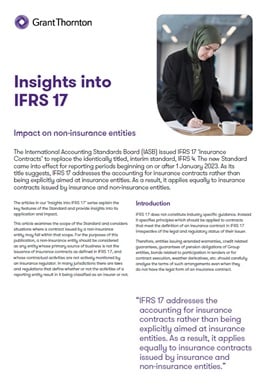IFRS 17 does not constitute industry specific guidance. Instead it specifies principles which should be applied to contracts that meet the definition of an insurance contract in IFRS 17 irrespective of the legal and regulatory status of their issuer. Therefore, entities issuing extended warranties, credit related guarantees, guarantees of pension obligations of Group entities, bonds related to participation in tenders or for contract execution, weather derivatives, etc. should carefully analyse the terms of such arrangements even when they do not have the legal form of an insurance contract.
The significance of IFRS 17’s scope for non-insurance entities IFRS 17’s definition of an insurance contract and its scope have not changed significantly from what was set out in IFRS 4, which might lead non-insurance entities into thinking they need not concern themselves with this Standard.
IFRS 4 had allowed entities issuing insurance contracts to carry on accounting for them using policies that had been developed under their previous local accounting standards. This meant that entities have continued to use a multitude of different approaches for accounting for insurance contracts, making it difficult for the users of financial statements to compare and contrast the financial performance of similar reporting entities. This is not the case under IFRS 17, which goes much further to solve the comparison problems created by IFRS 4 by requiring all insurance contracts to be accounted for in a consistent manner. Specifically, the Standard requires entities to use a current measurement model for their insurance liabilities, using updated information for risks and obligations. As with all principles-based standards, there are still differences in methods that may be applied, such as determining discount rates or risk adjustments. However this is still a significant improvement over the requirements of IFRS 4.
Non-insurance entities that had previously applied IFRS 4 were able to apply their existing accounting policies to insurance contracts that fell within the scope of that Standard. However when applying IFRS 17 they can only apply accounting policies that are permissible under IFRS 17 for any reporting period that begins on or after 1 January 2023. Non-insurance entities need to be alert to the possibility that contracts they have issued (or may issue in the future) might now fall within the scope of the new Standard.
We share further insights in the PDF, which can be downloaded below.
